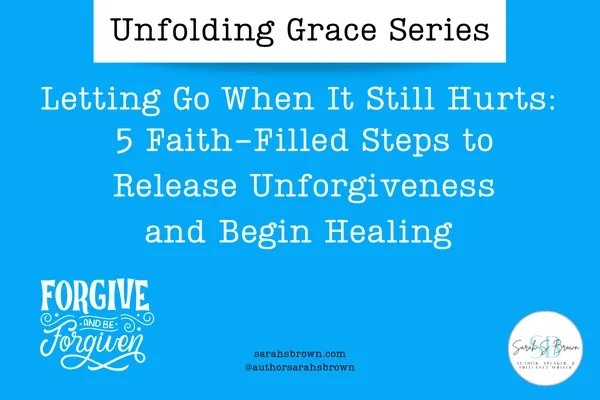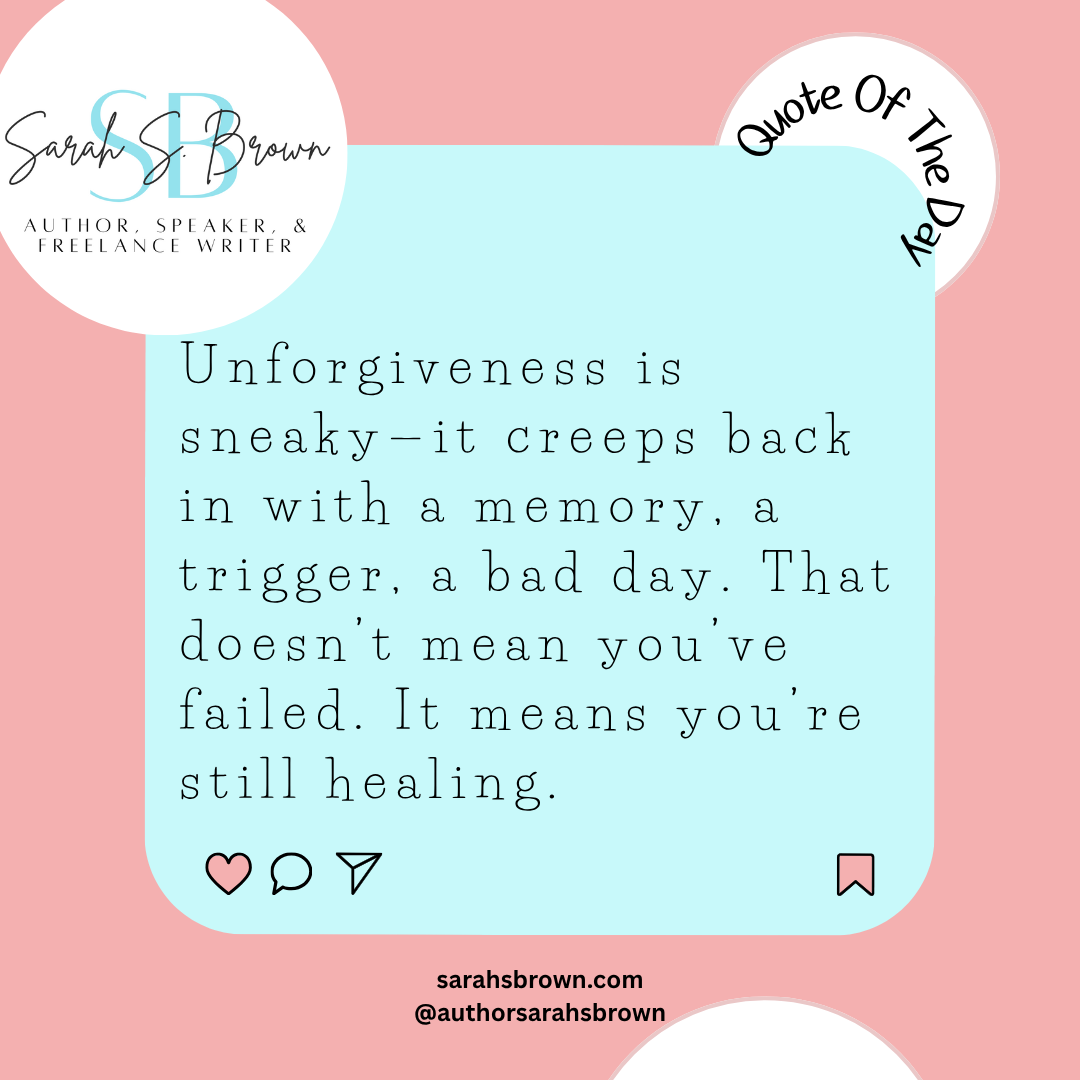
Letting Go When It Still Hurts: 5 Faith-Filled Steps to Release Unforgiveness and Begin Healing
Letting Go When It Still Hurts
5 Faith-Filled Steps to Release Unforgiveness and Begin Healing

If you’ve ever thought, “I should be over this by now,” you’re not alone.
Though I am a bit ashamed to admit it, I held unforgiveness in my heart for 12 years for the way someone hurt me. It was no small hurt, and it was no small act to find forgiveness in my heart. It took years of God chipping away at the bitterness and anger that had grown deep roots in my spirit. God gently reminded me that the person of whom I was unforgiving was also His child and just as deserving of forgiveness as I am. I was holding out for an apology, and that’s not always something we get, nor is it a requirement before be able to forgive the one who has hurt you.
Through my experience, I came to realize that forgiveness is a journey.
Letting go of unforgiveness is one of those brave, gritty choices that doesn’t always come with instant relief—but it does open the door to healing. Here are five grace-filled ways to begin releasing it, with scriptures and prompts to help you process each step with God.
1. Acknowledge the Pain Honestly
Before you can release unforgiveness, you have to face what happened and admit how it hurt you. Not sugarcoating it. Not brushing it off. Just telling the truth. God isn’t asking you to pretend it didn’t hurt—He’s inviting you to bring the real, raw version of your pain to Him.
“Pour out your heart before Him; God is a refuge for us.” – Psalm 62:8 (ESV)
Pause to think or write about these questions:
What happened that hurt you, and how has it impacted your heart, thoughts, or even your relationship with God? Be honest—this is a safe space between you and your Heavenly Father.
2. Choose Release Over Revenge
Forgiveness doesn’t mean what happened was okay. It means you’re no longer letting bitterness write the rest of your story. Release the need for payback, not because the person deserves it, but because you deserve peace.
Try praying: “God, I choose to let go of what I’ve been carrying. Help me leave justice in Your hands and live in freedom.”
“Do not repay anyone evil for evil... Do not take revenge, my dear friends, but leave room for God's wrath.” – Romans 12:17, 19 (NIV)
Consider these questions:
What need for control, closure, or justice are you holding on to? What might it look like to release that to God instead of carrying it on your own?

3. Pray for the One Who Hurt You
This one’s hard. But it’s powerful. Jesus said to pray for our enemies not because it’s easy, but because it shifts our hearts. Even a simple prayer like, “Lord, I don’t know how to love them right now, but You do” is a step toward healing.
“But I say to you, love your enemies and pray for those who persecute you.” – Matthew 5:44 (ESV)
Ask yourself…
What do you wish this person knew or understood? Try writing a prayer—not a polished one, just an honest one—asking God to work in their heart and in yours.
4. Remember How Much You’ve Been Forgiven
When you realize the grace God has poured out on you, it softens the soil of your heart. You’re not forgiving from your own strength—you’re drawing from His well of mercy.
“Be kind and compassionate to one another, forgiving each other, just as in Christ God forgave you.” – Ephesians 4:32 (NIV)
Think about it…
How has God shown you grace and mercy in your own life? How does remembering His forgiveness help you take a step toward offering it to someone else?
5. Let Go Daily if You Have To
Unforgiveness is sneaky—it creeps back in with a memory, a trigger, a bad day. That doesn’t mean you’ve failed. It means you’re still healing. So keep choosing forgiveness, again and again, like a sacred act of trust.
Think of it like peeling off layers. Some days, you’ll uncover a little more—and that’s okay.
“Then Peter came to Jesus and asked, ‘Lord, how many times shall I forgive my brother or sister who sins against me? Up to seven times?’ Jesus answered, ‘I tell you, not seven times, but seventy-seven times.’” – Matthew 18:21–22 (NIV)
Think about or journal your response to these questions:
When have you thought you were “done” forgiving—only to have the pain resurface? What does it look like to trust God with this process, even if it takes time?

Forgiveness doesn’t erase what happened—but it does free you from having to carry the weight of it alone. If you’ve been waiting for a sign, for the perfect moment, or for someone else to make it right first, consider this your gentle nudge: you don’t have to wait to begin healing. God sees the wound, the ache, the years it’s taken to get here—and He’s not rushing you. He simply invites you to take the next step with Him. One surrendered moment at a time. One prayer. One choice to let go. You don’t have to have it all figured out. You just have to be willing to place your hurt in the hands of the Healer. Forgiveness is the way forward—not because it’s easy, but because freedom is worth it.
